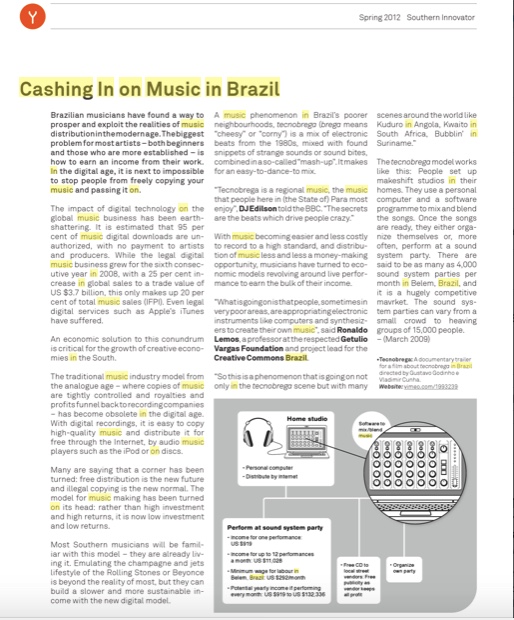By David South, Development Challenges, South-South Solutions

Brazilian musicians have found a way to prosper and exploit the realities of music distribution in the modern age. The biggest problem for most artists – both beginners and those who are more established – is how to earn an income from their work. In the digital age, it is next to impossible to stop people freely copying your work and passing it on.
The impact of digital technology on the global music business has been earth-shattering. It’s estimated 95 percent of music digital downloads are unauthorized, with no payment to artists and producers. While the legal digital music business grew for the sixth consecutive year in 2008, with a 25 percent increase in global sales to a trade value of US$3.7 billion, this only makes up 20 percent of total music sales (IFPI) (http://www.ifpi.org/). Even legal digital services like Apple’s iTunes have suffered (http://www.apple.com/downloads/).
An economic solution to this conundrum is critical for the growth of creative economies in the South.
The traditional music industry model from the analogue age – where copies of music are tightly controlled and royalties and profits funnel back to recording companies – has come unstuck in the digital age. With digital recordings, it is easy to copy high quality music and distribute it for free through the Internet, by audio music players like the iPod or on discs.
Many are saying a corner has been turned: free distribution is the new future and illegal copying is the new normal. The model for music making has been turned on its head: from high investment and high returns, it is now low investment and low returns. And this model chimes very well with the world most Southern musicians live in. The chances for most of emulating the champagne and jets lifestyle of the Rolling Stones or Beyonce is beyond their reality. But they can build a slower and more sustainable income with the new digital model.
A music phenomenon in Brazil’s poorer neighbourhoods, tecnobrega (brega means cheesy or corny) is a mix of electronic beats from the 1980s, mixed with found snippets of strange sounds or sound bites, combined in a so-called ‘mash-up’ (http://en.wikipedia.org/wiki/Mashups). It makes for an easy-to-dance-to mix.
“Tecnobrega is a regional music, the music that people here in (the state of) Para most enjoy,” DJ Edilson told the BBC. “The secrets are the beats which drive people crazy.”
With music becoming easier and cheaper to record to a high standard, and distribution of music less and less a money-making opportunity, musicians have turned to economic models revolving around live performance to make the bulk of their income.
“What is going on is that people, sometimes in very poor areas, are appropriating electronic instruments like computers and synthesizers to create their own music,” said Ronaldo Lemos, a professor at the respected Getulio Vargas Foundation (http://www.fgv..br/ ) and project lead for the Creative Commons Brazil (http://creativecommons.org/international/br/).
“So this is a phenomenon that is going on not only in the tecnobrega scene but with many scenes around the world like Kuduro in Angola, Kwaito in South Africa, Bubblin’ in Suriname.”
The tecnobrega model works like this: People set up makeshift studios in their homes. They use a personal computer and a software programme to mix and blend the songs. Once the songs are ready, they either organize themselves, or more often, perform at a sound system party. There are said to be as many as 4,000 sound system parties per month in Belem (http://en.wikipedia.org/wiki/Bel%C3%A9m) and it is a hugely competitive market. The sound system parties can vary from a small crowd to heaving groups of 10 to 15,000 people.
The money for performing at these parties is good. A musician performing just once can make 2,200 realis (US $919), and can do this 12 times a month. This is a good income compared to the minimum wage in Belem: 700 realis (US $292). It is estimated it generates US $1.5 million a month in Belem.
In Brazil, where many do not have broadband Internet and thus can’t download music, fans buy pirated and cheap compact discs (CDs) in markets. Local musicians make their own CDs and give them free to local street vendors. While they make no money off the CDs that are then sold by the vendors, they do drum up publicity and profile. And they then use this to draw large paying crowds to their live gigs.
In just a few years, tecnobrega has become a multi-million dollar music business in Brazil. Once an artist has gained experience performing live at the parties, they can develop the skills to organize their own events, and boost their income accordingly.
One singer who has successfully exploited the opportunities raised by the tecnobrega phenomenon is Gaby Amarantos (http://www.youtube.com/watch?v=ZKjH__ghQa4 ). She now regularly appears on TV.
“We have found a new way to work,” she told the BBC. “It is a new format and a new market model because we produce the music ourselves and the cost to make one song is very cheap.”
“What happens is that the musicians skip the intermediaries,” said Ronaldo Lemos.
“So the musicians do not make money from the CDs that are sold by the street vendors, they actually make money by playing live at the so-called sound system parties – the aparelhagem parties as we tecnobrega say here in Brazil – and also by selling CDs after they play live.
“No-one expects to make money from the CDs – they use it as a way to advertise the music and to advertise themselves as artists, and then their expectation is that they get invited to play at the sound system parties and clubs.
“The more their music gets distributed, the more they will make money in return.”
The furious pace of innovation in the tecnobrega scene is all about generating more revenue and more income. New styles emerge to cater to new tastes: cyber tecnobrega, brega melody, electro melody. And this passion for innovation has kept the tecnobrega entrepreneurs ahead of the traditional music business in how it uses digital technologies.
Lemos calls tecnobrega a “globoperipheral music”: it transcends rich and poor divisions and geographical boundaries.
Other examples include Argentina’s Cumbia Villera, or Brazil’s Funk Carioca.
“The number one lesson would be innovation – if you want to survive in the music industry right now you have to innovate,” said Lemos.
Published: March 2009
Resources
- Good Copy, Bad Copy: A Danish documentary film by director Andreas Johnsen about the global explosion in movie- and music-making because of the digital revolution. Website: http://www.goodcopybadcopy.net/
- A documentary trailer for a film about tecnobrega in Brazil directed by Gustavo Godinho e Vladimir Cunha. Website:http://www.vimeo.com/1993239


Development Challenges, South-South Solutions was launched as an e-newsletter in 2006 by UNDP’s South-South Cooperation Unit (now the United Nations Office for South-South Cooperation) based in New York, USA. It led on profiling the rise of the global South as an economic powerhouse and was one of the first regular publications to champion the global South’s innovators, entrepreneurs, and pioneers. It tracked the key trends that are now so profoundly reshaping how development is seen and done. This includes the rapid take-up of mobile phones and information technology in the global South (as profiled in the first issue of magazine Southern Innovator), the move to becoming a majority urban world, a growing global innovator culture, and the plethora of solutions being developed in the global South to tackle its problems and improve living conditions and boost human development. The success of the e-newsletter led to the launch of the magazine Southern Innovator.


This work is licensed under a
Creative Commons Attribution-Noncommercial-No Derivative Works 3.0 License.
ORCID iD: https://orcid.org/0000-0001-5311-1052.
© David South Consulting 2023


Leave a comment